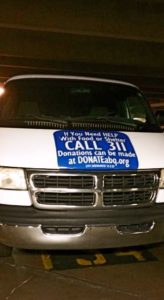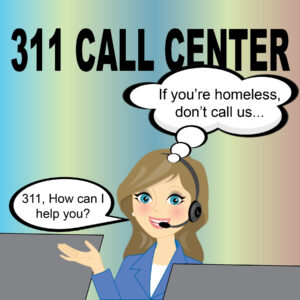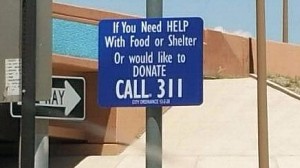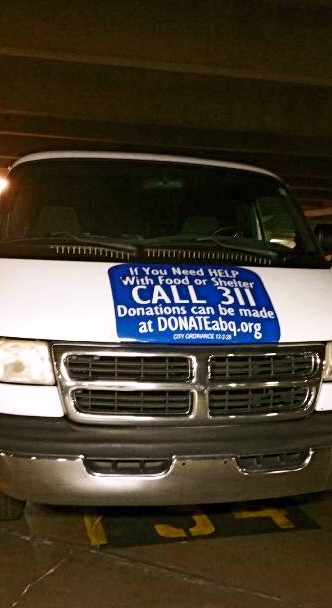By Jeremy Reynalds, Ph.D.
Founder and CEO
Joy Junction Inc.
Former Deputy City Attorney and Chief Public Safety Officer Pete Dinelli said City’s lack of background checks for “A Better Way” Program are “are exposing people to unnecessary risk” and City couldn’t escape liability in the event of an incident
 According to its website, in September 2015, the City of Albuquerque found a van in the City’s motor pool, wrapped it in the “There’s a Better Way” graphics, and launched the “There’s a Better Way” van with St. Martin’s Hospitality Center.
According to its website, in September 2015, the City of Albuquerque found a van in the City’s motor pool, wrapped it in the “There’s a Better Way” graphics, and launched the “There’s a Better Way” van with St. Martin’s Hospitality Center.
With a initial budget of $50,000, the City’s Solid Waste Department drives to areas frequented by panhandlers and offers them day labor for $9 an hour, such as landscape beautification and garbage removal.
At the end of the day, the city says passengers are transported back to St. Martin’s to be connected with emergency shelter to house them overnight as needed. That’s if they can find the van, or the van can find them. In a local story, Albuquerque Mayor R. J. Berry suggested that the homeless call 311 to coordinate a pickup.
In fiscal year 2017, the City has budgeted $181,000 for the program.
I have no problem admitting that giving a job for the day to a few panhandlers willing and able to work is (potentially) a great idea. However, I do have still unanswered questions-which city administration has repeatedly failed to address-about liability issues if one of those individuals working for a day commits some sort of offence. Who ends up paying?
One of my staff called City Hall in an attempt to find out. Speaking to a man identifying himself as Allen, he asked if background checks were done on those working in the program? Allen said there are no background checks, and workers are not city employees. They work through St. Martin’s, which operates the program with a grant from the city. So who picks up the tab if the worker gets injured or hurts someone? Allen told my staff member that St. Martin’s has insurance that would cover this.
Sounds okay, right? But you know that any half way decent attorney isn’t going to stop at St. Martin’s (a great agency), if there’s a problem. They’re going to tap the city’s risk management fund, which has already paid out big bucks for other unrelated cases in the last few years.
Former Deputy City Attorney and Chief Public Safety Officer Pete Dinelli agreed with me. He said, “You are correct. This would be a City sanctioned program, and the City cannot escape liability in the event of an incident ,and no doubt would be sued.”
He was also concerned about the lack of background checks and said it was unnecessarily exposing people to risk.
There’s an obvious problem here, so while not negating its virtues, let’s not pretend that this small program is an example for the nation, and that Albuquerque has gotten it together when it comes to panhandling and housing the homeless.
Sadly, that’s the impression given by some national media whose stories mostly relying on Albuquerque Mayor R.J. Berry’s “spin” have been picked up by many other regional and local publications.
In addition, a “fluff piece” from the PBS Show Religion and Ethics Newsweekly for which I was interviewed failed to address any of the concerns I voiced to the reporter, or raised here.
Despite this and other concerns, the program is spreading across the country.
I hope that their motives are better than what appears to be happening here in Albuquerque. In response to some of my concerns, a Washington Post reporter asked me by email whether something wasn’t better than nothing. Not necessarily.
We need to remember that in the mayor’s rush to rid the city of panhandlers that a number of those so doing have mental health issues, PTSD, felony backgrounds, and other challenges. They panhandle for a few hours, and at times and on days when they feel emotionally equipped to face (at least to some extent) some of the daily rigors of living.
Some individuals will always be dependent on the largesse of others, and we as a community have a moral and societal obligation to assist them. If people stop giving donations to them, how will they survive?
It’s a well known fact that many homeless adults have physical and other types of disabilities. According to one site, almost half (46 percent) reported chronic physical conditions.
Problems with alcohol, drugs, and mental health among homeless people are well documented and often occur together. Among adults using homeless services, 31 percent reported a combination of mental health and substance abuse problems (alcohol and/or drugs) within the past year.
An additional 17 percent reported problems with drugs and/or alcohol problems, but no mental health problems.
In addition, according to the same source, 12 percent reported only problems with alcohol, and 15 percent reported only mental health problems. Only one in four homeless adults did not report any mental health or substance abuse problems during the past year.
According to the City, donations given to the United Way anti-panhandling program “now have the potential to have a collective impact. For example, a driver could hand $5 out the window to a panhandler and help them purchase one meal – or they could donate $5 to Roadrunner Food Bank and feed 20 people.”
And then there are those  prolific blue anti-panhandling signs that sprouted up like mushrooms across Albuquerque last year.
prolific blue anti-panhandling signs that sprouted up like mushrooms across Albuquerque last year.
They tell people needing help with food or shelter to call the city’s 311 infoline. While not mentioning that 311 only operates from 6 a.m. through 9 p.m. six days a week, what help is actually offered if you do call? A city website says that out of 11,016 assistance calls, 96 percent are getting connected to services.
I wondered about that. Does getting connected to services mean actually finding resources that can assist the caller, or just giving out a provider name and number regardless of whether it is open or appropriate.
Our experience found the latter. A little while ago I had a number of Joy Junction staff call the 311 service posing as homeless people in need of help, and see what they were told.
What I learned was that if you need food or shelter, don’t call 311. 
A staff member called 311, and asked if they could refer him to a shelter that would take in a family of five comprised of two adults and three children.
He was referred to Catholic Charities and St. Martin’s Hospitality Center. These are good programs, but far from being the answer to what was needed.
While a great resource for its core missions, Catholic Charities does not provide emergency shelter.
As the group states on its website, “Catholic Charities partners with Barrett House in this collaborative effort to end the cycle of homelessness.”
And while another great agency providing an array of services for the homeless, St. Martin’s does not provide emergency shelter.
Another staff member called 311, saying that his family of two adults and two children needed shelter. He was referred to the Barrett Foundation, Catholic Charities and Safe House.
While an excellent resource, the Barrett Foundation does not provide emergency shelter and neither does it assist men.
The agency says on its website, “Call us at 505-243-4887 Monday-Friday from 9 a.m. to 4 p.m. to speak with a staff member, or leave a detailed voicemail with your contact information. We log every call to the shelter and will call you back when we have a vacancy.”
Safe House is for victims of domestic violence. It is hard to fathom why our employee was told to call there.
The shelter’s mission statement says, “To shelter and empower survivors of intimate partner domestic violence, while working to break the cycle of domestic violence.”
Another Joy Junction staff member’s call to 311 was met with an equal amount of wrong (and what would have been very frustrating) information had the situation been real.
Representing her family as being made up of two adults and two children, he was referred to Catholic Charities, St. Martin’s and the Albuquerque Rescue Mission. At the time of writing, the Mission was closed to new residents while working on expansion and renovation.
An employee’s call asking for shelter for himself and his two children resulted in a referral to the Barrett Foundation, Catholic Charities and St. Martin’s.
When a different staff member called 311 asking for a referral for shelter for two adults and a child, he was given similarly poor information. He was directed to call the Barrett Foundation, Catholic Charities, Health Care for the Homeless, or St. Martin’s.
A Joy Junction staff member called saying she had an addiction, and was looking for shelter for her family of two adults and three kids.
She was referred to A New Awakening Counseling Services, Albuquerque Metro Central Intake, (providing access to free treatment for alcohol and substance abuse problems) and Alcoholics Anonymous.
A female employee called 311, asking for a referral to a family shelter for herself and two children. She was directed to call the Barrett House, Family Promise or (finally) Joy Junction.
Family Promise of Albuquerque “can provide shelter for up to four families at a time in the Interfaith Hospitality Network. We provide the shelter by partnering with 19 congregations around Albuquerque.”
It doesn’t appear to provide emergency shelter.
Then a staff member called 311 and told the the operator he was broken down in Albuquerque with his teenage sons, and needed assistance until he could get his vehicle fixed.
The operator told him she didn’t have any resources for vehicle repairs, but could provide numbers for several shelters
Her first suggestion was the Albuquerque Rescue Mission, which she said was open year round and has check ins between 3 p.m. and 8 p.m.
The operator’s next referral was to the Albuquerque Opportunity Center, which she told our employee is listed as “men only.”
The agency website says , “The AOC Emergency Shelter has 54 beds that provide men a safe environment for overnight sleeping and daytime storage of belongings for up to 30 nights.”
He asked 311 if they would take his 16 and 19-year-old sons.
Our employee called the number given to ask about availability of space for his 16-year-old, and got a recorded message basically saying there were no current openings and to try again tomorrow.
Next on the list of helpful suggestions from 311 was the Good Shepherd Center, which the operator admitted was only for men 18 years old and up.
Also offered were The Rock at Noonday and St. Martins. Joy Junction was given as a shelter to call.
While Joy Junction was only listed as a resource twice by my staff who called, my heart hurt-not for us as we have plenty of clients-but for the new homeless in town who will see these signs and think they’ll get help. They might, but not much-and definitely not between 9 p.m. and 6 a.m. or on a Sunday.
As people who have homes, but every now and again have to call large companies for a service request, we all know the frustration of wading through numerous voice mail options, getting referred from one employee to another or even getting disconnected.
We usually make such calls from the comfort of our own home while perhaps enjoying a cup of coffee or a cool beverage. Can you imagine the frustration, and additional feelings of hopelessness and despair felt by needy individuals who call 311 (possibly exhausted after trudging the streets of Albuquerque) trusting that they will get access to the help they so desperately need?
311 for the homeless is a disgrace. This aspect of the service either needs to be dramatically improved, or eliminated. Albuquerque, we can do better!


